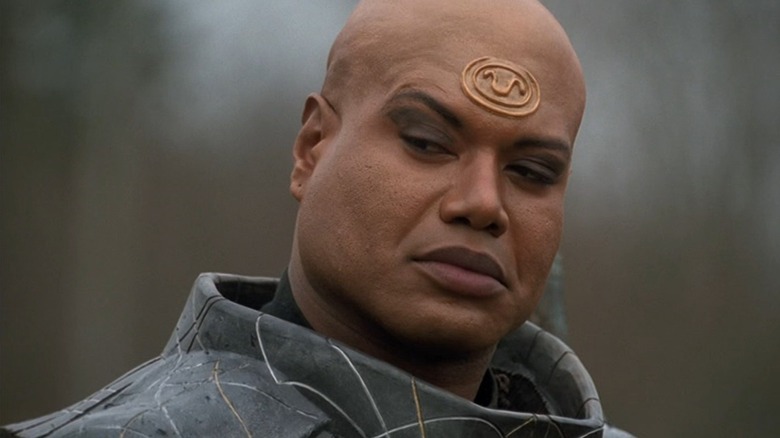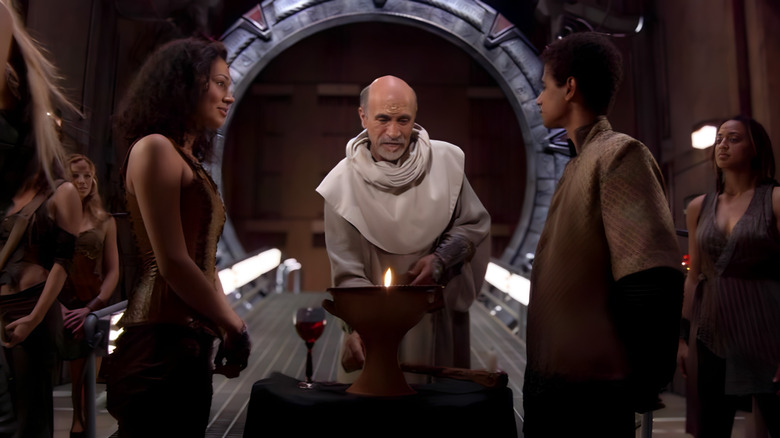“Stargate SG-1” produced several great episodes before it got canceled after season 10. Nonetheless, a few of the episodes began out as utterly totally different concepts solely to tackle new kinds through the writing course of. A key instance is the classic “Lost City” two-part episode, which was originally envisioned as a feature film. Elsewhere, season 8’s “Sacrifices” was imagined as a comedy referred to as “My Huge Fats Jaffa Wedding ceremony,” but it surely took on a extra somber tone in a while.
“Sacrifices” is about Rya’c of Chulak’s (Neil Denis) try and marry Kar’yn (Mercedes de la Zerda), which does not go down effectively with their households and results in some disagreements. That mentioned, Christopher Choose, who performed Teal’c and wrote the episode, informed GateWorld that he realized it could not be a comedy because the story explores concepts like struggle, tyranny, and Moloc’s (Royston Innes) enslavement of the Jaffa individuals:
[As] I began writing it, it did not prove as humorous as I assumed it was going to be, as a result of there have been critical points that wanted to be addressed so far as their freedom, their purpose, the entire Jaffa motion — and so far as the entire Jaffa motion of freedom, and the way the Hak’tyl do not essentially see eye to eye with the larger motion. And they will go about their liberation in a different way.”
Whereas the “Stargate SG-1” writers sometimes pushed comedic ideas to the limit, they’d legitimate causes to withstand making “Sacrifices” a laugh-out-loud caper. The excellent news, although, is that Choose discovered from the expertise.
Stargate: SG1’s Sacrifices episode was a studying expertise for Christopher Choose
Whereas Christopher Choose’s authentic plan for “Sacrifices” by no means got here to fruition, he understands that it is simply the character of writing tv. Throughout the aforementioned interview, he revealed that the episode needed to match into the collection’ larger image, and the Jaffa freedom storyline did not precisely lend itself to comedy. That mentioned, Choose discovered an empathetic ear in collection producer Robert Cooper, who understood the idea of concepts changing into extra critical than they had been initially supposed to be:
“I mentioned, ‘I do not know. It is not humorous.’ And he mentioned, ‘You realize, a variety of occasions these begin out in our minds as what is going on to be type of a lighter episode. However when there are points that it’s important to take care of due to an ongoing storyline, a variety of occasions it does not find yourself the way in which you envisioned it as a result of it’s important to tackle sure points.'”
Regardless of his authentic concept not figuring out, it feels like Choose had a variety of artistic freedom on the collection. Moreover, expertise and knowledge has allowed Judge to come up with some sound advice for the creators of a potential “Stargate: SG-1” reboot down the road. If that challenge ever involves fruition, he hopes that the writers make the present their very own and are not beholden to what got here earlier than.
“Stargate SG-1” produced several great episodes before it got canceled after season 10. Nonetheless, a few of the episodes began out as utterly totally different concepts solely to tackle new kinds through the writing course of. A key instance is the classic “Lost City” two-part episode, which was originally envisioned as a feature film. Elsewhere, season 8’s “Sacrifices” was imagined as a comedy referred to as “My Huge Fats Jaffa Wedding ceremony,” but it surely took on a extra somber tone in a while.
“Sacrifices” is about Rya’c of Chulak’s (Neil Denis) try and marry Kar’yn (Mercedes de la Zerda), which does not go down effectively with their households and results in some disagreements. That mentioned, Christopher Choose, who performed Teal’c and wrote the episode, informed GateWorld that he realized it could not be a comedy because the story explores concepts like struggle, tyranny, and Moloc’s (Royston Innes) enslavement of the Jaffa individuals:
[As] I began writing it, it did not prove as humorous as I assumed it was going to be, as a result of there have been critical points that wanted to be addressed so far as their freedom, their purpose, the entire Jaffa motion — and so far as the entire Jaffa motion of freedom, and the way the Hak’tyl do not essentially see eye to eye with the larger motion. And they will go about their liberation in a different way.”
Whereas the “Stargate SG-1” writers sometimes pushed comedic ideas to the limit, they’d legitimate causes to withstand making “Sacrifices” a laugh-out-loud caper. The excellent news, although, is that Choose discovered from the expertise.
Stargate: SG1’s Sacrifices episode was a studying expertise for Christopher Choose
Whereas Christopher Choose’s authentic plan for “Sacrifices” by no means got here to fruition, he understands that it is simply the character of writing tv. Throughout the aforementioned interview, he revealed that the episode needed to match into the collection’ larger image, and the Jaffa freedom storyline did not precisely lend itself to comedy. That mentioned, Choose discovered an empathetic ear in collection producer Robert Cooper, who understood the idea of concepts changing into extra critical than they had been initially supposed to be:
“I mentioned, ‘I do not know. It is not humorous.’ And he mentioned, ‘You realize, a variety of occasions these begin out in our minds as what is going on to be type of a lighter episode. However when there are points that it’s important to take care of due to an ongoing storyline, a variety of occasions it does not find yourself the way in which you envisioned it as a result of it’s important to tackle sure points.'”
Regardless of his authentic concept not figuring out, it feels like Choose had a variety of artistic freedom on the collection. Moreover, expertise and knowledge has allowed Judge to come up with some sound advice for the creators of a potential “Stargate: SG-1” reboot down the road. If that challenge ever involves fruition, he hopes that the writers make the present their very own and are not beholden to what got here earlier than.




















